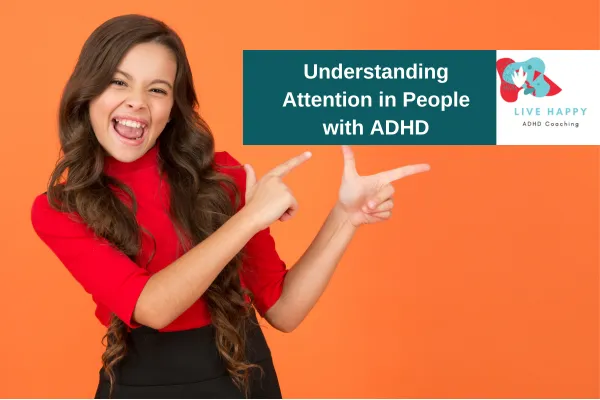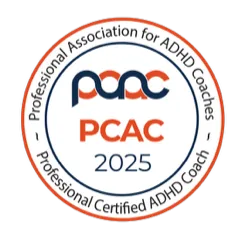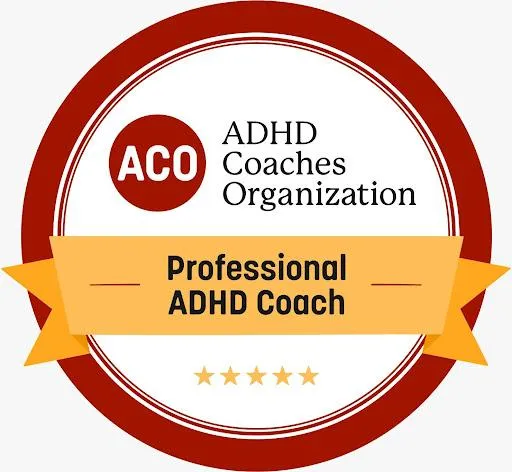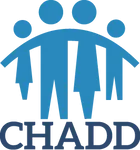Live Happy ADHD Coaching
Welcome.
Are you ready for a change but keep hitting roadblocks?
I can help you move from survival mode to thriving and reconnecting to the joy of life. I help my clients stay on track, create calm, and bring out the best in themselves. I invite you to learn how to enhance the way your unique ADHD brain works, instead of working against it.
Meet your Coach

I used to struggle with exactly the same thing.
Dorsey McFadden currently lives in Richmond with her husband and pets. She earned a double BA degree from the University of North Carolina at Chapel Hill in Political Science & Communications and International Security Studies & Rhetoric.
In her previous life, Dorsey worked in digital marketing for over 20 years. Now she’s building a career as an ADHD coach, educator, and advocate.
She also cofounded FlexYourADHD.com as a platform with a significant community of adults eager to learn about their ADHD.
As the founder and coach of Live Happy ADHD Coaching, Dorsey is passionate about coaching adults living with ADHD and parents of children with ADHD to help them live happy and healthy lives.
Together, she works with her clients to develop techniques and approaches to better understand how to support themselves and their children.
Dorsey aims to empower those with ADHD to work with their unique brain, not against it.

Meet your Coach
I used to struggle with exactly the same thing.
Dorsey McFadden is a certified ADHD coach, educator, and advocate through training from the ADD Coach Academy (ADDCA), holding credentials from both ADDCA and the Professional Association of ADHD Coaches (PAAC). Based in Richmond, she lives with her husband and pets. With over 20 years of experience in digital marketing, she brings a wealth of strategic insight to her coaching practice. Dorsey holds a double BA from the University of North Carolina at Chapel Hill in Political Science & Communications and International Security Studies & Rhetoric.
As the founder of Live Happy ADHD Coaching and FlexYourADHD.com, Dorsey is passionate about helping adults with ADHD and parents of children with ADHD build happier, more fulfilling lives. She partners with her clients to create personalized strategies that harness the strengths of the ADHD brain, focusing on empowerment, self-understanding, and practical support systems.
Dorsey's mission is simple: to help people stop fighting against their ADHD and start thriving with it.
While there's no magic solution in life, the supportive, practical, concrete, and collaborative process of coaching can help to bridge the gap between where you are right now and where you want to be.
Do any of these sound familiar?

difficulty with planning and prioritizing
feeling unfulfilled and unsuccessful
impaired communication or social skills
trouble getting started/lack of initiative
difficulty maintaining focus
poor self-care (exercising, getting to bed, etc.)
difficulty explaining their ADHD to others
getting easily distracted and overwhelmed
challenges with working memory
poor time and energy management
lack of organizational skills
trouble harnessing motivation and interest
impulsivity/lack of inhibition
procrastination (sometimes extreme and high stakes)
poor communication skills
difficulty with planning and prioritizing
feeling unfulfilled and unsuccessful
impaired communication or social skills
trouble getting started/lack of initiative
difficulty maintaining focus
poor self-care (exercising, getting to bed, etc.)
difficulty explaining their ADHD to others
getting easily distracted and overwhelmed
challenges with working memory
poor time and energy management
lack of organizational skills
trouble harnessing motivation and interest
impulsivity/lack of inhibition
procrastination (sometimes extreme and high stakes)
poor communication skills

Testimonials
What Does Success Look Like?

That depends on the client.
For some it will look like completion of a project while, for others, it may be development of self compassion and self
awareness which enriches all areas of their life.
What Is Coaching?


Coaching is the facilitation of growth and change. A coaching partnership helps close the gap between who you are, what's important to you, and what you're doing. so that you can lead a more satisfying and effective life. Coaches support our client's understanding of their ADHD brain and its related challenges. As well as how it impacts your personal and professional life so that you can utilize practical, realistic strategies to shift from chaos to calm.
What Does Success Look Like?
That depends on the client.
For some it will look like completion of a project while, for others, it may be development of self compassion and self
awareness which enriches all areas of their life.


What Is Coaching?
Coaching is the facilitation of growth and change. A coaching partnership helps close the gap between who you are, what's important to you, and what you're doing. so that you can lead a more satisfying and effective life. Coaches support our client's understanding of their ADHD brain and its related challenges. As well as how it impacts your personal and professional life so that you can utilize practical, realistic strategies to shift from chaos to calm.
More Topics to explore
Something for every reader

Understanding Attention in People with ADHD
Attention is a cognitive process that allows us to select and concentrate on specific stimuli while ignoring others. This ability is crucial for navigating daily life, managing tasks, and responding to our environment. However, for those of us with Attention Deficit Hyperactivity Disorder (ADHD), managing attention can be a constant battle, often leading to chaotic and overwhelming experiences.
The Multifaceted Nature of Attention
Attention is not a singular process but a collection of sub-processes that function together. According to the hierarchical model proposed by Sohlberg and Mateer, attention can be divided into several distinct types:
Arousal: Our level of alertness and activation, whether we feel energized or tired.
Focused Attention: The ability to concentrate on a specific stimulus.
Sustained Attention: The capacity to focus on a stimulus or activity over an extended period.
Selective Attention: The ability to focus on one particular stimulus while ignoring distractions.
Alternating Attention: The skill of shifting focus between different tasks or stimuli.
Divided Attention: The ability to simultaneously pay attention to multiple stimuli or tasks.
The Neuroanatomy of Attention
Attention involves various systems and brain regions. The neuroanatomical model by Posner and Petersen outlines three key attentional systems:
Reticular Activating System (RAS): Responsible for arousal and sustained attention involving the reticular formation, frontal areas, limbic systems, thalamus, and basal ganglia.
Posterior Attentional System (PAS): Manages focused and selective attention, particularly visual stimuli, and involves the posterior parietal cortex, lateral pulvinar nucleus of the thalamus, and superior colliculus.
Anterior Attentional System (AAS): Handles selective, sustained, and divided attention linked to the prefrontal, dorsolateral cortex, orbitofrontal cortex, anterior cingulate cortex, supplementary motor area, and neostriatum.
Attention in Daily Life
Attention is fundamental in many aspects of daily life. For instance, driving requires almost all types of attention: staying awake (arousal), focusing on the road (focused attention), maintaining attention over long periods (sustained attention), ignoring irrelevant stimuli (selective attention), switching focus between the road, mirrors, and dashboard (alternating attention), and managing multiple actions like steering, accelerating, and checking mirrors (divided attention).
In academic settings, attention is vital for learning and retaining information. Sustained attention helps students remain focused during long study sessions, while selective and alternating attention aids in managing multiple sources of information and distractions.
Professionally, different jobs demand various types of attention. For instance, an air traffic controller needs high levels of divided and alternating attention, while a writer may rely more on sustained and selective attention.
ADHD and the Battle for Attention
ADHD is characterized by difficulties controlling and directing attention and managing behavior. The brains of those of us with ADHD show anatomical differences in several regions, including the nucleus accumbens, striate nucleus, putamen, amygdala, hippocampus, prefrontal areas, and thalamus. These differences are linked to delays in brain maturation and contribute to the symptoms of ADHD.
A unique aspect of attention in ADHD is the phenomenon often referred to as “hyperfocus.” However, this term can be misleading as it encompasses two different mental states: flow and perseveration.
Flow: This is a positive, beneficial state of deep immersion and high engagement in a task or activity, typically accompanied by enjoyment. It is a universal human experience and is not unique to individuals with ADHD.
Perseveration: This is a characteristic of ADHD. It represents the inability to switch between tasks or mental activities, often leading to spending excessive time on a single activity, even when moving on to something else is necessary.
Other conditions also affect attention, such as anxiety and depression, which can heighten attention to negative stimuli, or brain injuries, which can lead to issues like distractibility or conditions like hemineglect.
Imagine being unable to tear yourself away from a task, even as your world crumbles around you. That’s the harsh reality of perseveration in ADHD. It’s not just a quirky trait—it’s a debilitating struggle that can disrupt every aspect of life.
In closing
Attention is a complex and essential cognitive process that affects every aspect of our daily lives. For those of us with ADHD, managing attention can be particularly challenging due to underlying neuroanatomical differences and the unique phenomenon of perseveration. However, understanding these challenges can lead to better strategies and support for those of us with ADHD, ultimately helping us navigate our daily lives more effectively.
How Does Coaching Work And How Does It Help You?
Coaching sessions create space away from day to day demands for a dialogue between the coach and client. The client determines the long-term direction of coaching and is responsible for bringing a topic/issue/question to each session. Together, the coach and client explore who the client is, who they think they are, and who they want to be in order to clarify desired outcomes and actions to further the client’s agenda.
As a coach, I will ensure we make the most of your time. My role is to be your sounding board, mirror, and champion your efforts. I will provide models and structure to help you organize your thoughts, beliefs, and values. I will help you to bring details into focus to reach a deeper understanding and appreciation of yourself. I will hold you accountable for your decisions and actions and challenge you to be compassionate with yourself while setting realistic and achievable goals.
However, I will never tell you what to do. Coaching sessions offer an opportunity for you to learn something new about yourself, a different way of thinking about a situation, or uncover a belief that was limiting the options you thought were available to you. The “work” to apply this learning toward changing your life continues beyond the coaching session.
Welcoming clients of all races, cultures, identities and orientation
Disclaimer: Coaching is not to be used as a substitute for professional advice by legal, medical, financial, business, spiritual or other qualified professionals. We encourage our clients to seek independent professional guidance for legal, medical, financial, business, spiritual, or other matters. With Coaching, all decisions in these areas are exclusively the responsibility of the client who acknowledges that decisions and actions as a result of coaching are their sole responsibility.
Example Topics for Coaching
ADHD Life skills & Executive Functioning
Relationship Skills
Friendship and Support System
Parenting Children with ADHD
Organizing Skills
Addiction Dangers
Emotional Regulation
Mindset Improvement
Work/Life Balance
Communication Skills
Self Awareness
Self Compassion & Mindfulness
Study Skills
Self Care Skills
Time Management
Task Management
Advocating Skills
Routines and Systems
Healthy Boundaries
Managing your life
Planning & prioritizing
Putting plans into action, task initiation
Goal-directed persistence
Taking actions that align with your physical & emotional needs
Learning new strategies to manage executive functioning
Navigating neurodivergent relationships
Self-regulation & interoceptive-awareness
Emotional impulsivity
Communication strategies
Physical health and wellness
ADHD Coaching & Consulting by Dorsey McFadden
Located in Richmond, VA
Accepting clients Worldwide






Facebook
Instagram
LinkedIn